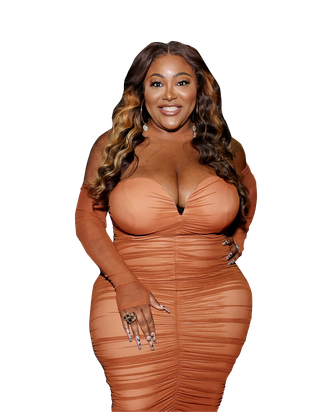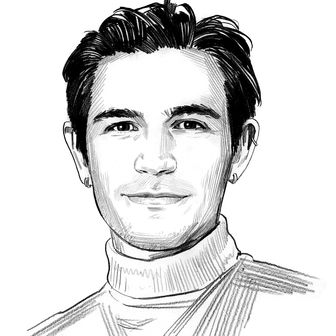
If pure unadulterated star power was the only feature necessary for success, Ts Madison would have been a household name a long time ago. When she first blew up on Vine due to the indelible sight of her bragging about her “New weave, 22 inches,” then twerking naked, it was clear: This was a person who was meant to be seen. At the time, she was working from home as a porn star, adding the “Ts” to her name because it was an internet-porn search-friendly moniker denoting her as a “transsexual.” Though the internet of 2014 may have been laughing at her, she was able to laugh her way to the bank: She bought her first home with the money she made from her work in porn after the publicity of Vine increased her subscriptions. Eight years later, she’s getting closer to the mainstream than ever. She was recently included among the legion of Black queer creators sampled on Beyoncé’s Renaissance, appearing on the song “Cozy.” She’s been a recurring judge on RuPaul’s Drag Race. She was the first Black trans woman to star in and produce her own talk show, WeTV’s The Ts Madison Experience. Last year, she played a small role in Janicza Bravo’s Zola. Now, she’s making her biggest step into the mainstream yet with a large supporting role in Billy Eichner’s upcoming romantic comedy, Bros.
In Bros, Ts Madison plays Angela, a member of a board working alongside Eichner’s character, Bobby, to develop the national museum of LGBTQ history. The board is made up of an assortment of queer people, all of whom represent different factions of the queer community, with Angela being the sole voice in the room for Black trans women. In the context of Bros, the first gay rom-com produced by a major studio for theaters, that role will make her the sole voice for Black trans women in a lot more rooms than just the ones onscreen. Ahead of Bros’ wide release on September 30, Madison opened up about being a Black trans woman in the middle of a white gay love story; being in a film produced by Judd Apatow, whose previous movies like 40-Year-Old Virgin have included homophobic and transphobic jokes; and what it would look like if one day she’s allowed to tell her own story at the Bros level.
How did you become involved with Bros?
I got an email from a casting company saying, “Hey, the producers are interested in you reading the sides for Cherry.” When you get sides for a movie, you don’t know what the movie’s about, you don’t know a backstory or anything. I read the side for every boardroom character except for Robert, who ended up being played by Jim Rash. I read for everybody’s role in the room, and then I didn’t hear anything. I was like, Oh, I really must have bombed. I had my manager email the casting agency to see what was going on, and they were like, “Oh no, no, there weren’t any decisions yet. The producers are trying to figure out what’s gonna happen with this whole COVID pandemic, see if it’s a thing.” It became a thing, and then that thing closed us down, so I went about my life doing everything and nothing at all. Then fast-forward to August, we got the call: “Hey, you know that thing that you did last year? Well you got cast in it.” Then I started getting the information: It’s a movie by Billy Eichner, with Nicholas Stoller, Judd Apatow, Universal Pictures. And I said, “Wait, wait, you mean like Jurassic Park? Jurassic World? You mean Jurassic Universal? Okay, I’m in!”
How did the role change when you came on?
The role changed a lot. My character was supposed to be a Black transgender woman who’s on the board of directors, and there were some lines that they had given me at first that probably wouldn’t have sounded true coming from me. There were a few things that were changed until they got the tone right for me.
If you’re familiar with Ts Madison, you know that Ts Madison, honey, she’s a hurricane. In this, I couldn’t come in as a hurricane — I was a bit of a tropical storm. And it’s okay to be a tropical storm sometimes.
The museum portions of Bros are made up of delegations from each identity in the queer community coming together to decide how they want the community to be seen. That felt like a literalization of a conversation that is constantly being had.
Yes, but I think it’s not a conversation that’s had enough. Even though our communities are together, we still are so separate. Even when it comes down to Pride, there’s gay pride, there’s white pride, there’s Black pride, there’s trans pride, and then there’s lesbian pride. I’m like, “Well, honey, what do I do all June?”
What do you want the people who are a part of the queer community, but aren’t Black trans women, to take away from Angela?
I want them to understand that to have a table, you need a person to create a table. Sometimes our voices are not loud enough to create a table. Billy created a table. He and Nicholas Stoller took a script down to Universal Pictures, and they gave them the green light to go with it. It takes a person who uses their privilege to walk into Universal and say, “Hey, let’s make a rom-com about two gay men.” It is then his responsibility and duty, which he did, to bring every piece, every moment, and every fracture of the community to the table. That’s how it’s supposed to happen.
We got a question at TIFF about how the movie started out with them nodding to the Black and brown contributions, like Marsha P. Johnson and Sylvia Rivera being at the forefront of the gay rights movement, but then the movie has two white men and it’s about their love story. For me, yes, that would come up. If Black trans women are at home watching it … I’m just gonna be honest. I want my Black trans women that are watching this film to understand that he did what he was supposed to do, as far as using his privilege as a cis gay white man, to bring us to the table for conversation and to make changes and the movement in the world.
If it is that foot in the door that can make it so that a Ts Madison movie could exist in the future, what does that movie look like?
The Ts Madison movie would definitely maneuver through the obstacles that I have faced as a Black trans woman who was trying to discover herself. I have a background in a Christianity and was raised in the church. I’m not against it now, but I still … I have to question it. It would definitely be a comedy, because you have to laugh. If you can get a person in a comfortable enough place to laugh, then you could slide in the punchline that Here’s what you’re supposed to learn. You make them go, Oh, I would have never thought about it like that, but you made me think. By the end of the movie, you’d have learned about all spectrums of trans people. I identified myself as a gay man at one point in my life! For a small, very tiny point. That would most definitely be a Ts Madison movie.
It makes sense that it would have to be a comedy, because everyone knows you as someone they can laugh with. You began doing that on Vine, but later you said that one of the joys of Bros was that people are laughing with you instead of at you. How does the laughter feel different?
In Bros, it was basically like turning the mirror around to straight people. Straight people, you’ve been poking fun, you’ve been poking jokes at gay people, at trans people, for your entire existence. Now we have the pen. You have to sit out here and you have to watch yourself. We’ll do what you’ve done to us. How does it feel? How does it feel, honey? So either you stop it, or we can turn the heat up, because we only scratched the surface, darling. We could read you girls for filth if we want to. [Laughs.]
One person who I think had to have heard that was Judd Apatow. What did it feel like to be in a movie produced by him when some of his previous movies included content that was transphobic?
Well, here’s the thing: In order for something to change, you have to stand in its face. You can’t stand on the outside of something and want it to change, you gotta stand right there in his face and be like, Boom, here we go. So he can be like, You’re right, I did that. So let me turn it around and let you do it to me. That’s what a roasting is, that’s what comedy is. So instead of it being so transphobic or homophobic, now it becomes a roast. We have the knife, we have the fork, and we about to eat you up, honey.
You said recently that you feel like you’re growing into a “RuPaul status.” One connection between the two of you is that you’re similar types of do-it-all entertainers: You’re in movies, you make music, you’re a talk-show host. How do you think of all of the different components that you do as parts of one whole Ts Madison experience?
I’ve always pulled inspiration from RuPaul, because if you asked me who I had to look to in history that is some subform of me, it would definitely be RuPaul. She’s been in the business for almost 40 years now — that’s a long time. There are so many aspects of so many pieces of her that I find in me. I’ve heard people say that they’ve had these experiences with her that were not pleasant — I’m not cooking up something, that’s not new. I’ve never had an experience with RuPaul that was unpleasant. Never. She sent me a happy birthday from around the world last year. You can’t get RuPaul in drag to do anything that she’s not getting $150,000 for, and she sent me a happy birthday. She makes space for me. She doesn’t block anything for me to receive. She could have easily told the World of Wonder, “Honey, don’t let that bitch in here.” But she didn’t.
And for me, she is a key component to the Ts Madison experience. She sees pieces of herself in me, just like I see me in her. She’s always given me the best advice. I love her and I appreciate her existence. Those are the pieces of her in the Ts Madison experience.
This interview has been edited and condensed.


